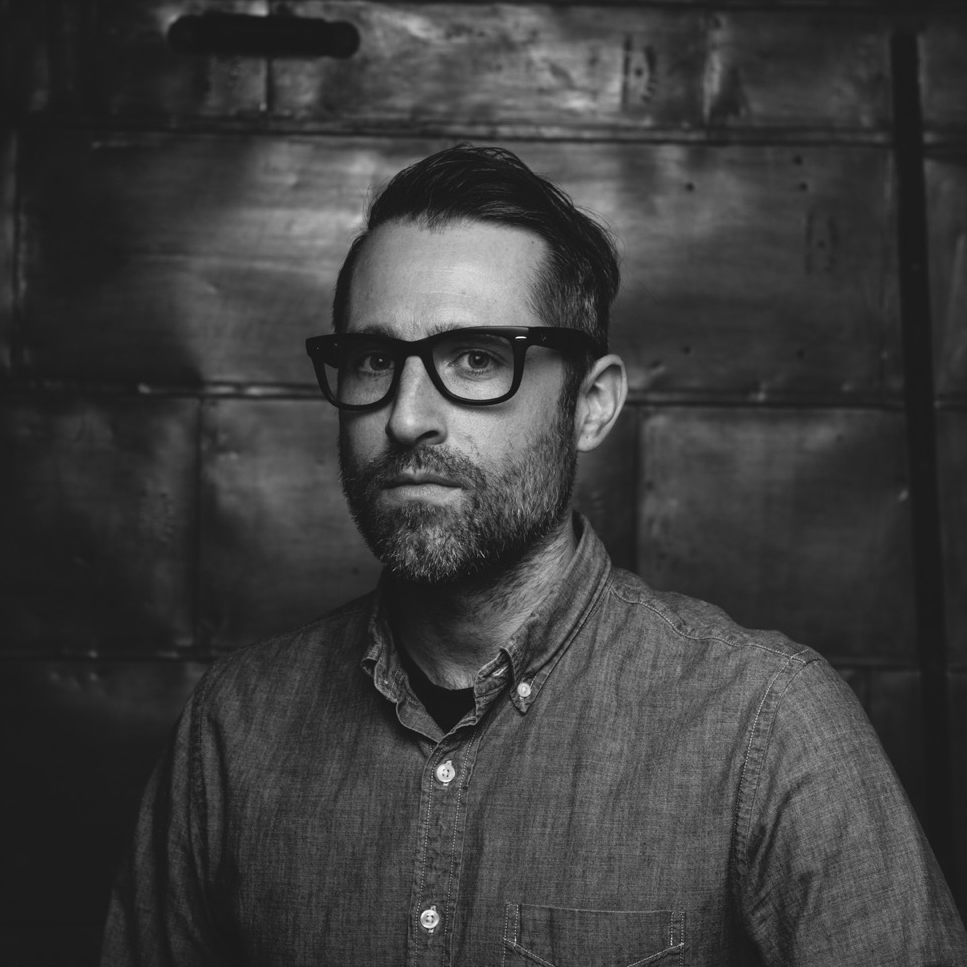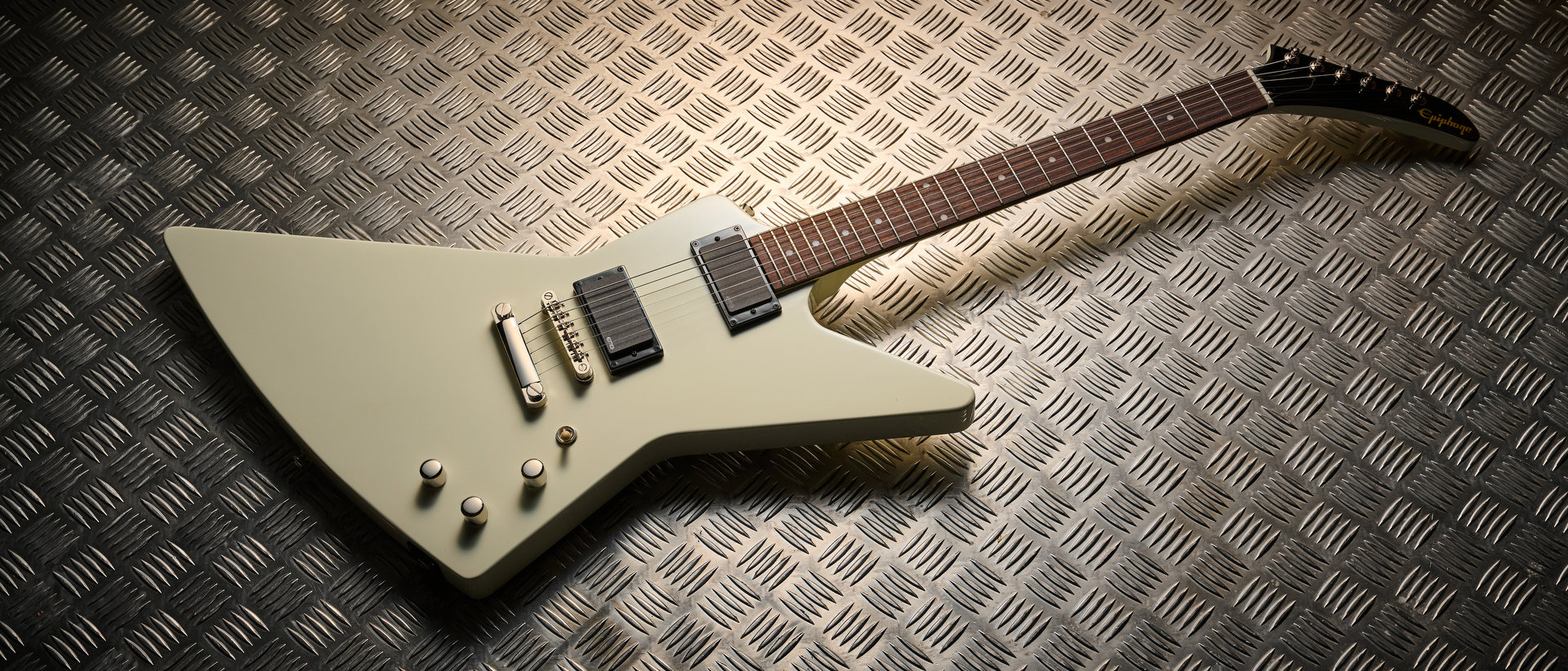Gojira's Joe Duplantier: "My approach to guitar is very physical… but not sexual!"
The pick-scraping frontman details the themes, tones and influences behind Fortitude, and talks songcraft, Death, Whammy pedals and that fine-looking mahogany Charvel...
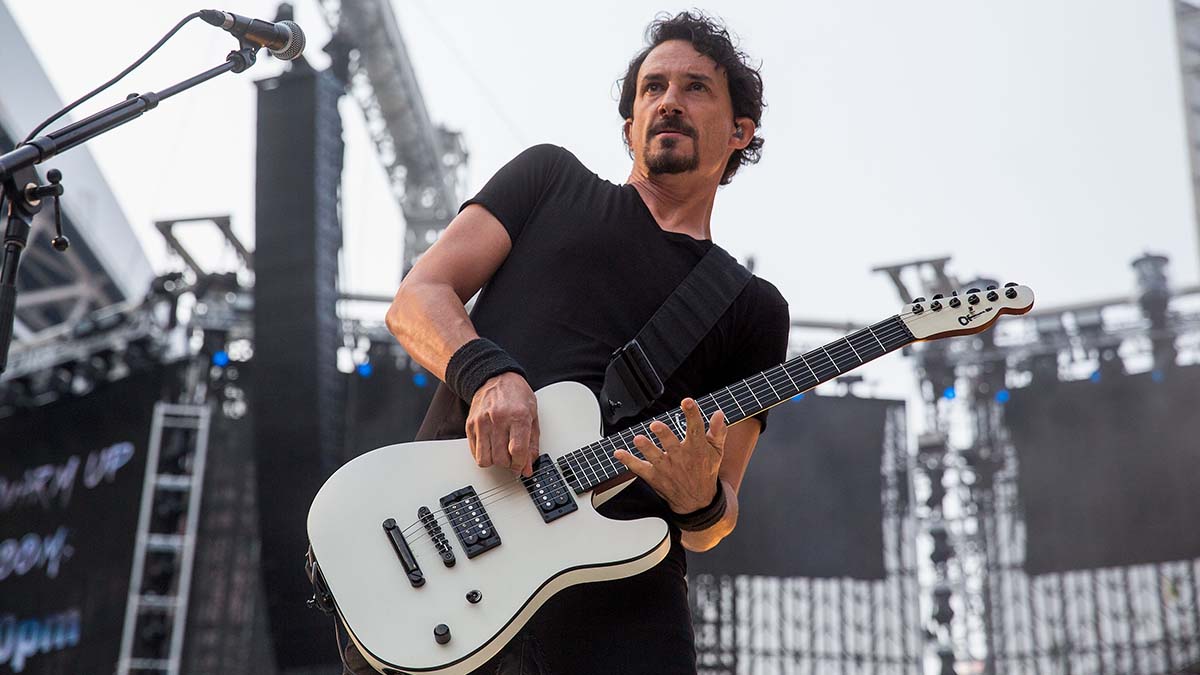
For a generation of young headbangers, Gojira are the new titans of groove metal: progressive, heavy-hitting riff giants continuing in the lineage of Metallica, Sepultura, Pantera, Lamb of God and others.
And just like the six-string legends that preceded them – Hetfield, Cavalera, Dimebag and more – central to the French band’s success is a modern metal rhythm guitar hero: Joe Duplantier. But good luck approaching him with that kind of praise.
“I’m not an awesome guitar player,” retorts Duplantier, who’s also Gojira’s singer, producer and primary songwriter. “Sure, I have my technique and experience, but if you drop me in a room full of people jamming blues, it’s gonna be a little difficult. There’s going to be a lot of wrong notes in there. [Laughs] I don’t have my scales down and I’m not a shredder or anything.”
I watched all of Metallica’s concerts and videos and I told myself that’s what I wanted to do
Joe Duplantier
Duplantier’s humility (and lack of blues chops) aside, what the musician does possess is that enviable, elusive holy grail for a guitarist: a unique voice. He calls it the “Gojira language”, and it’s instantly recognizable from the moment the cavalcade of distorted pick-scraped riffs, propulsive hammer-on rhythms and intoxicating atmospherics come roaring out of his amplifier.
Since Gojira formed in 1996 (first as Godzilla, before adopting their current moniker in 2001), their career has followed a steady trajectory upward. Duplantier and his band – which also includes his brother Mario Duplantier on drums, bassist Jean-Michel Labadie and lead guitarist Christian Andreu – have continuously refined their musical chops and expanded their artistic vision across six albums.
And with each one, from 2001’s fierce debut Terra Incognita and 2005 breakout From Mars to Sirius to 2016’s Grammy-nominated Magma, Gojira have earned more fans, more critical praise and more respect from many of their own heroes. Lamb of God’s Randy Blythe was an early backer (and guested on 2008’s The Way of All Flesh), and Metallica, Slipknot, Rammstein and others have personally recruited them as tour support.
Gojira’s seventh and latest record, Fortitude, is primed to be their biggest outing yet. The initial preview of the album arrived back in August 2020, when Gojira surprise-dropped their first new song in four years, Another World. Fans went wild – and the epic rager became an instant hit for the band and their first Billboard-charting single ever.
All the latest guitar news, interviews, lessons, reviews, deals and more, direct to your inbox!
Six months later, in February of this year, Gojira premiered Fortitude’s second punishing single, Born for One Thing – and its accompanying video topped a million views within days. So, by all measures, expectations are pretty high ahead of the album’s April release (via Roadrunner Records). But Duplantier isn’t really sweating it.
While he’s definitely grateful for the external praise and accolades (“Being nominated for a Grammy was incredible!”), he says any pressure he’s experiencing is self-administered – and stems from his own infinite ambitions.
“People ask me, how do you deal with the pressure?” he says. “I’m like, ‘Honey, this is nothing.’ [Laughs] This pressure is nothing compared to the pressure I’m putting on myself. This is our life. We have a purpose to create something artistic, something to survive for eternity…”
Duplantier is discussing these points with Guitar World via Zoom from France. The guitarist was born in Paris but has called New York City home for some years – it’s where he started his family and launched Silver Cord Studio in Queens (where he recorded and produced Fortitude).
But because of the coronavirus, and NYC’s cramped living situation, he’s temporarily renting a house on France’s southwest coast, near Biarritz, to get some breathing room and be closer to his extended family and the rest of his band.
In real life it would be impossible to achieve what you can with that plugin. You can explore each riff [in] a million possibilities… the flexibility is mind-blowing
Joe Duplantier
Duplantier grew up in this same picturesque region along the Atlantic Ocean. It’s where he learned to play guitar – through a deep-dive study of Metallica’s catalog – and eventually hatched the idea for Gojira (after discovering his younger brother Mario’s innate drumming skills).
It’s also the same area where he met his co-guitarist Christian Andreu. Like Duplantier, Andreu was a Metallica obsessive growing up. “Kirk Hammett is the guy!” Andreu says today. “I watched all of Metallica’s concerts and videos and I told myself that’s what I wanted to do.”
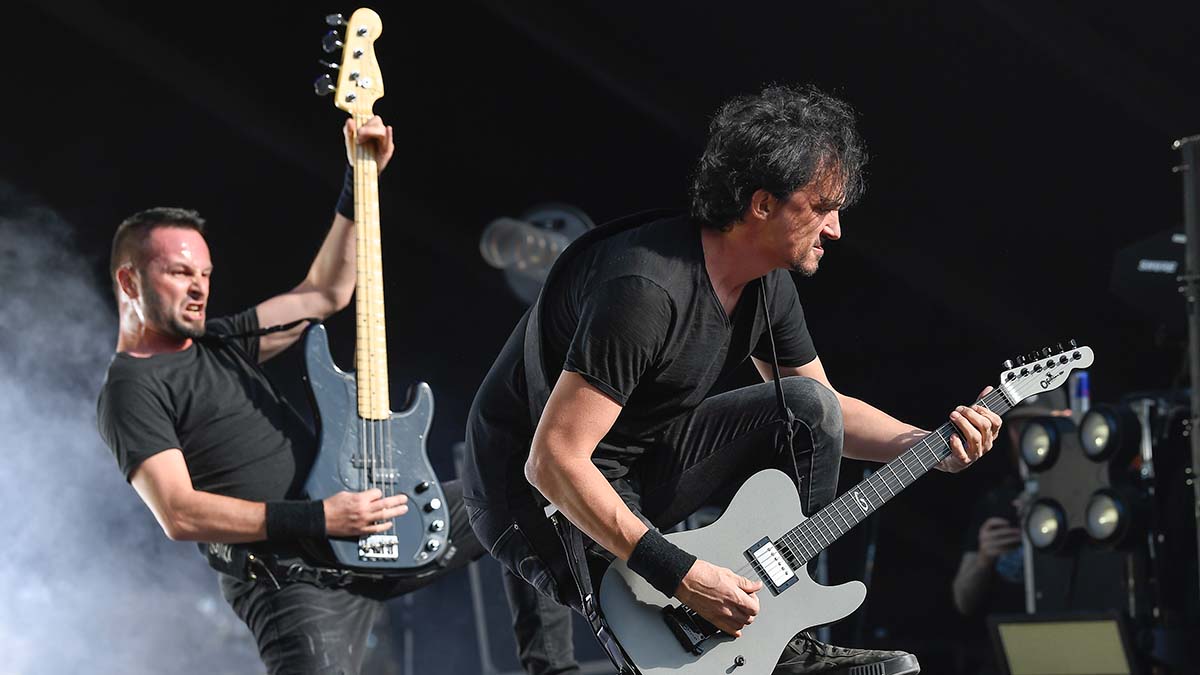
The young musician says he spent his teenage years alone in his room learning guitar with the help of tablature. His monastic dedication helped him develop a solid toolkit of technical skills, but he didn’t grasp the full creative power of his instrument until he connected with Duplantier.
Magma was written during a very difficult period for the band. It transcribed nostalgia, sadness and sometimes anger. Fortitude is much more focused on what’s happening on our planet
Christian Andreu
“I wasn’t too bad, but when I met Joe, I discovered an artist,” he recalls, “someone who puts his entire soul into every note… He taught me how to become one with my instrument. How to play with power and precision, being tight and exactly in time. It was always so natural for him.”
Duplantier, for his part, remains a humble collaborator and politely deflects any six-string compliments as they arise. (“I’m mainly a producer – that’s how I feel with music!”) But his skills are indisputable – as is his continued commitment to use his platform to address issues close to his heart: namely, the survival of planet Earth.
Environmental activism has been a major thematic element in Gojira’s music from day one: from Terra Incognita (inspired by Duplantier’s two-year experience living in a cabin without electricity) to Magma (a twofold study in grief about the passing of the Duplantiers’ mother and the potential ruination of the planet). Fortitude continues Gojira’s ecological mission – though this time the band rallied behind one additional unifying, and very humane, objective: uplifting people.
“Magma was written during a very difficult period for the band,” Andreu says. “It transcribed nostalgia, sadness and sometimes anger. Fortitude is much more focused on what’s happening on our planet … [and] that it is possible to change things.”
“I wanted people who heard Fortitude not to feel sad or grey,” Duplantier adds. “We wanted to come back with an album that was the opposite to Magma: very glowing, full of interesting things, musically rich with a message that inspires strength.”
Music-wise, that directly translated to Fortitude’s gorgeous textures, cinematic grandeur and stunning riffs – where ambient moments lull the listener before an overwhelming tidal wave of guitar comes crashing down.
Duplantier & Co. are still channeling some aspects of their forebears — from Metallica’s mid-tempo stompers (Sphinx) and Pantera’s breakneck grooves (Into the Storm) to Sepultura’s pummeling world music (Amazonia, Born for One Thing) and Death’s progressive extremity (Another World). But filtered through Gojira’s unique creative lens, the final result, as heard on Fortitude, is something entirely personal and undeniably fresh.
To bring their sonic visions to life, Duplantier and Andreu rely on a mix of modern gear with vintage sensibilities. Andreu’s arsenal is built around his beloved Jackson Rhoads RR, of which he has two signature models: USA RR Signature Satin Black and Pro Series RRT Natural.
“From the first time I tried that guitar, I never wanted to play anything else,” he says. “It fits perfectly on me and I absolutely love the shape. It’s as aggressive as it is beautiful.”
For amplification, Andreu employs an EVH 5150 III Stealth, which he triples for Gojira’s live shows.
“One goes into a Box of Doom isolation cabinet, loaded with a Celestion 150-watt Redback speaker,” he says. “The second goes to my live EVH cabinets onstage and the third goes to a Two Notes Torpedo Live digital load box and cab emulator, which serves as a spare.”
Andreu gets his distortion solely from his EVH amps and opts for an FX Loop featuring a TC Electronic Hall of Fame Reverb and Flashback Delay and a MXR Carbon Copy analog delay, plus a front-of-amp pedal chain that includes a Boss TU-3 tuner, DigiTech Whammy and an MXR Smart Gate Pro.
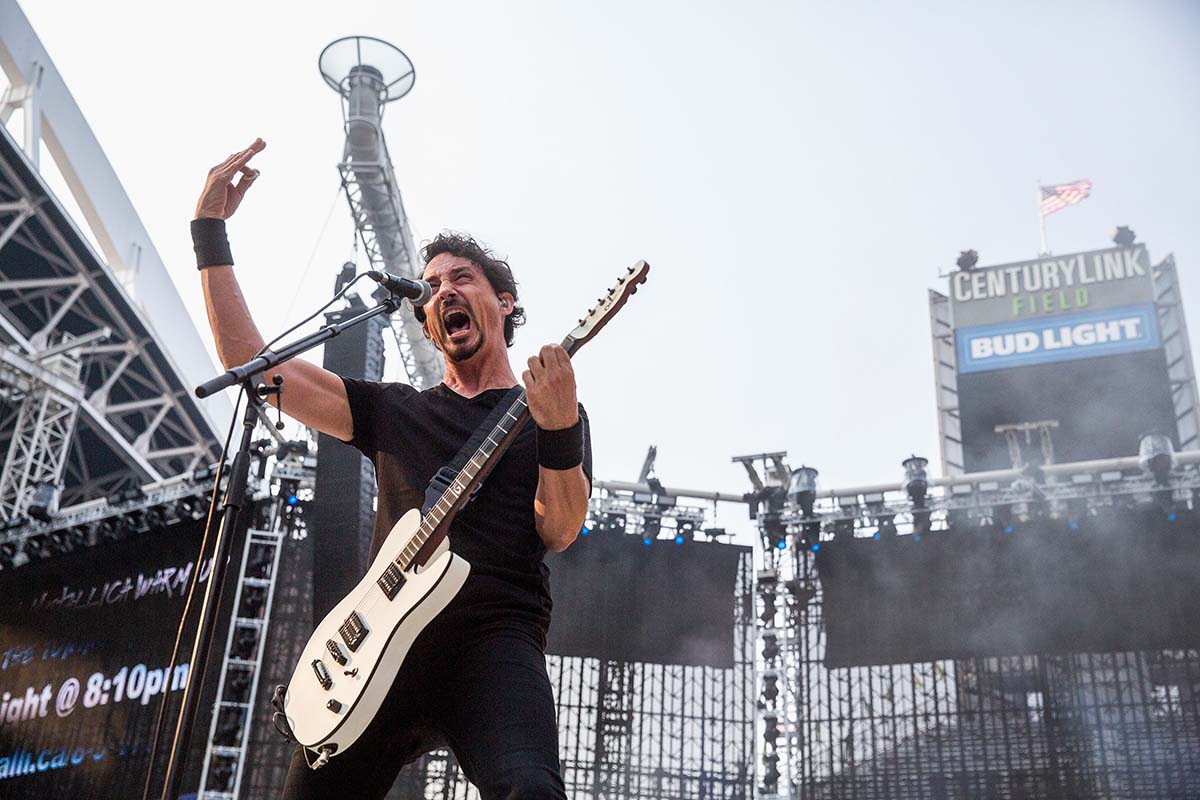
Duplantier is also an EVH guy and has used a few different amplifiers over his career: from a Stealth to his current 5150 III EL34 head. The guitarist has also partnered with Charvel Guitars for years and is particularly enamored with their latest collab: the Joe Duplantier Signature Pro-Mod San Dimas Style 2 HH Mahogany.
He used the T-style solidbody prototype on some of Fortitude, and throughout the pandemic has been jamming on the production version (which features his signature DiMarzio Fortitude bridge humbucker and a DiMarzio PAF 36th Anniversary at the neck). He also says that the axe has been handy to record demos for Archetype: Gojira – his new Neural DSP plugin that boasts three amps and a host of effects modeled after Duplantier’s personal rig.
I have mixed feelings about humanity. I don’t know what’s what. We live in a time where people question everything, all the conspiracy theories… It’s a bit overwhelming…
Joe Duplantier
“In real life it would be impossible to achieve what you can with that plugin,” he says. “You can explore each riff [in] a million possibilities… the flexibility is mind-blowing.” Both Duplantier and Andreu love their gear. Obviously, it’s an essential tool to create their art – but, thankfully, it’s also been one of a few welcomed distractions during the ongoing challenges and restrictions of the pandemic.
“I’ve gone through a few phases,” says Andreu of life in the age of COVID. “In the beginning there was a bit of panic… After that, I tried to use my time cooking, gardening and spending time with family… and of course playing guitar. Now, after one year, the pandemic… has pushed me to reflect on our future, our way of consuming… It’s been a profound experience.”
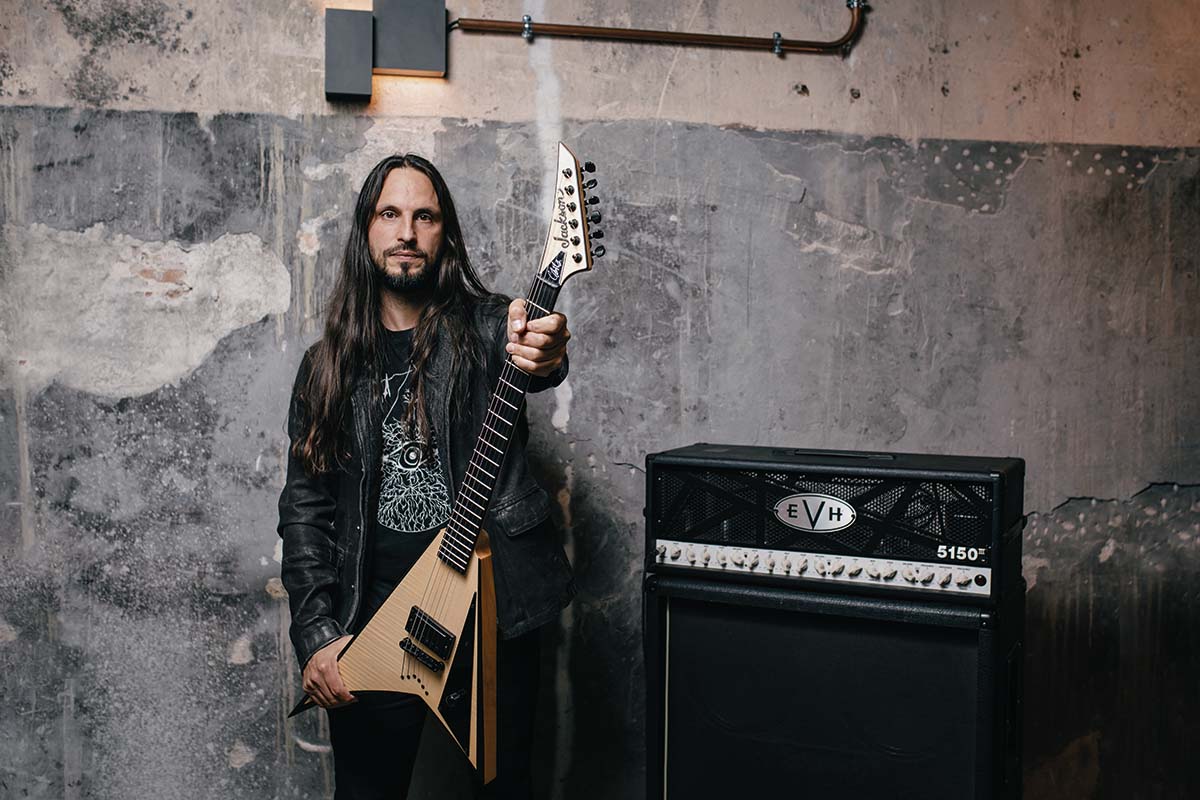
“I have mixed feelings about humanity,” Duplantier adds with a laugh. “I don’t know what’s what. We live in a time where people question everything, all the conspiracy theories… It’s a bit overwhelming… But I’m lucky enough to not work for a few months and to not be homeless. A lot of people lost that, and their jobs, which is disturbing… But for me, creatively, it’s very good because I had a chance to reboot. And for a few months now it’s been starting to itch: I want to play…”
In our far-ranging interview below, Duplantier breaks down for us the themes, techniques and influences behind Fortitude, reveals his ingenious trick to exorcise guitar “ghosts,” explains why musicians should embrace the power of Death, and much more.
The pandemic has turned many people’s lives inside out. How has it affected completing the new record?
”Well, we were done with the record before the pandemic began. But we weren’t done with the mixing, so I had to do that from a distance… From a producer standpoint, being away for that last step with [mixer] Andy Wallace – who I was so excited to work with – was kinda painful. But it went really smooth because he’s excellent.
For the first time in my life I had an entire year off. For me it was an incredible opportunity to keep track of my two kids… their little secrets and wiggly teeth and so on
Touring has also ground to a halt. What’s it been like being home so much?
”I’m used to being on the road six months to a year… For the first time in my life I had an entire year off. It’s a very special time. But it’s challenging because, all of a sudden, you’re all on top of each other! [Laughs] For me it was an incredible opportunity to keep track of my two kids… their little secrets and wiggly teeth and so on. [Laughs]”
Do you think either of your children are budding musicians?
”My six-year-old boy is playing drums. He picked it up like Mario did. I was very surprised… he’s very inspired. My girl, who’s eight, is playing piano, she sings, she comes up with lyrics. There’s a lot of music going on between us for sure.”
Beyond mixing Fortitude, and jamming with the kids, have you found much personal time to work on music during the pandemic?
”This whole pandemic thing was a curse – of course, because all our gigs were canceled – and a blessing. The good thing was it gave us time to try new things. I did some experiments at home. I did a Massive Attack cover, Atlas Air, just for myself. I had a blast doing that... I need music in my life all the time. I am producing all sorts of little demos and stuff. We’re about to jam with the band, and being in France makes it possible to gather and play together more often.”
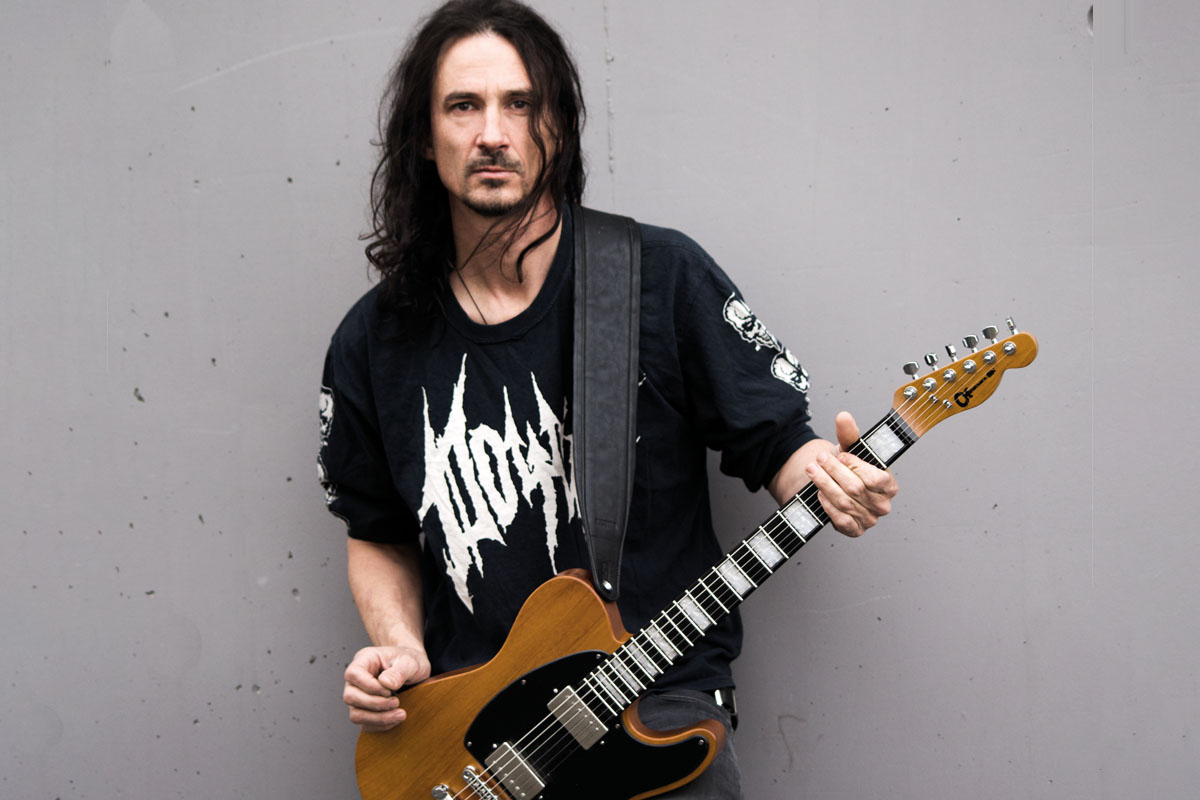
You mentioned Mario. Metal history provides quite a few examples of stellar guitar-drum sibling partnerships: the Cavaleras, the Van Halens, Dimebag and Vinnie Paul. Did you and your brother have an immediate musical connection?
”Absolutely, right off the bat. When we first jammed it was incredible… I was maybe 17 and he was 12… All of a sudden we were playing music and there was no age difference anymore. We were two souls working together to create something. It was very striking. There was so much maturity already in this 12-year-old boy behind the drumkit.”
What does that connection look like now after two-plus decades in Gojira?
”We have a bunch of shortcuts, so we don’t need to talk too much. Sometimes just a look. If he likes it, I know right away… We really understand each other in a very profound way, and to this day we’ve kept that.
Christian has been a part of Gojira’s creative process for a long time. But did it take him a while to find his place?
”Yes. But he has no ego, it’s incredible. He says, 'You know I’m here because I love you guys and what you do is amazing.' And he doesn’t like interviews very much because he feels like it’s almost not his thing… But he wrote some key riffs on every album and he comes up with great intros and atmospheres. And Jean-Michel also has a way to approach his lines that is very interesting and often not what we would imagine. We complete each other pretty gracefully.”
You’ve said you wrote Fortitude hoping it would “inspire strength.” What bands did that for you when you were younger?
“Metallica was my crush when I was a teenager. I discovered heavy music through Metallica. I was listening to them almost exclusively for several years, starting with Ride the Lightning… I learned a lot listening to their albums.“
You’ve also toured with Metallica. Did you learn any tricks watching them up close?
“Of course. Every time we’re watching Metallica – and all these bands that took us on the road like Behemoth, In Flames, Lamb of God, Rammstein – we’re always the geeks with our notebook taking notes. [Laughs] To give you a little technical thing: the whole ISO box thing we use on tour, we learned that from In Flames…
“The ISO box is a speaker in box, so you can crank your amp so it’s not going to bleed onstage. It’s a wonderful tool where you can really keep your microphone at the right distance to the speaker every night.“
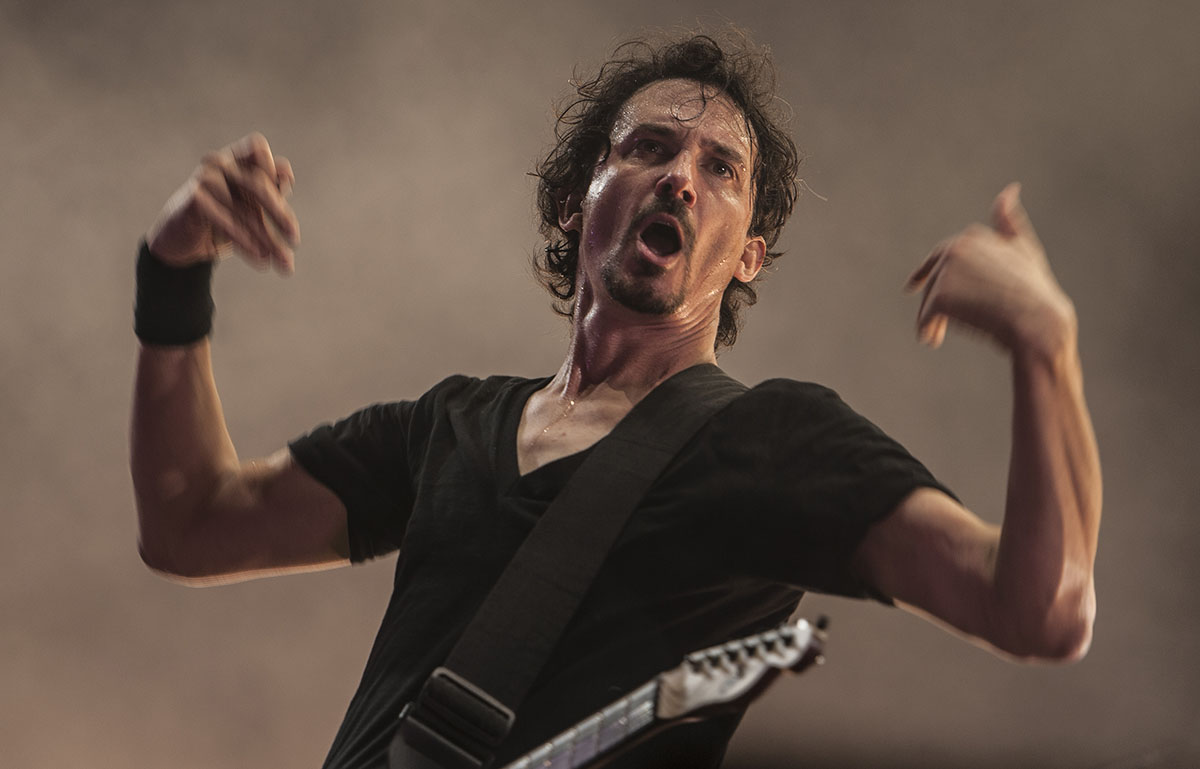
Let’s talk about songcraft. Gojira really balance the assault. Not everything is turned to 11, which adds power to the riffs when they’re eventually unleashed.
“We’re all about the dynamic… If there’s going to be an intense moment, it’s not necessarily the moment itself – but how you bring it. How you let things breathe and prepare, just like foreplay in the bedroom. It’s all about giving some space and then boom! [Laughs] We really like to sprinkle our albums with calmer songs…
When you listen to the old albums, like Black Sabbath or Led Zeppelin, you realize there’s so much power there – and it crushes the other bands that have the distortion on 15, with active pickups and all that stuff
“Then there’s the production. I used to put six guitars – three on the left, three on the right – and you couldn’t hear the guitar pick on the strings, just a big wall of sound. Yes, it’s impressive, but then I’d listen to the System of a Down album Mezmerize, and I was mesmerized. [Laughs] Because it’s raw as fuck, and there’s little distortion. But that’s what makes the whole thing super violent, because you feel the person playing the guitar and pounding the strings.
“Also when you listen to the old albums, like Black Sabbath or Led Zeppelin, you realize there’s so much power there – and it crushes the other bands that have the distortion on 15, with active pickups and all that stuff. The power, I think, is in the dynamic of the sound and the structure. We’re very preoccupied with the dynamic of our songs in every way possible.“
Fortitude’s debut single, Another World, contains a signature Gojira moment: the hammer-on rhythmic line. Is there any particular player who inspired that technique?
“Hmm… that’s a good question. It might be Death. Yeah, huge Death fan. Spiritual Healing, we took a lot from that record. And Symbolic. These albums are totally… I want to say underrated, but that’s not the case because people who know these albums, they worship them. It’s just a lot of people don’t know about Death and Chuck Schuldiner and the talent of that guy.
“On Another World, it’s all on two strings and the pick is striking the string one time for two notes because of the hammer-on. And then there’s this very lyrical moment later: it’s the same thing but without the palm mute choking the strings.“
I was a little late to the party, because I was listening to rap, like Public Enemy, and playing piano and classical music until I was 14
Hold On features a cool conversational thing between the multi-tracked vocals and the riff. Can you talk about that?
“This part is very dear to my heart. I put a lot of effort to make it sound as vintage as possible while keeping the power of the song going. It’s the only moment where I’m playing on the neck pickup. It gives it this extra weird vibe, because when you go from the bridge pickup to the neck it takes a second for the ear to get used to it because there’s this phase change somehow…
“I also had fun with that solo. I was never into solos… So for the first time I’m like, Come on man, you’ve got to come up with a solo! [Laughs] This song is interesting because there’s one main theme we play all the way through and we have these alien moments happening, that old-school sort of bridge-pickup part and then the tapping solo.“
Speaking of tapping, the guitar world lost a huge innovator last year with the passing of Edward Van Halen. Did you discover his playing as a kid, or was it only…
“…Metallica, Death, Morbid Angel, Sepultura, Pantera, Machine Head! [Laughs] I come from a small area in France and just a few bands made their way to my local shop… I was never introduced to EVH or the other greats, even Black Sabbath. I had to discover them way later. I was a little late to the party, because I was listening to rap, like Public Enemy, and playing piano and classical music until I was 14 – when I discovered Metallica and it changed my world completely.“
You mentioned Sepultura. I hear a bit of their vibe on Amazonia.
“Really? [Laughs] I’m not surprised, of course. It’s practically a shoutout to Sepultura. Arise, Chaos A.D., Roots… we grew up on that shit. At our first show in 1996, in the south of France in a small village, we played maybe 10 to 12 songs – and six of them were Sepultura covers.
At our first show in 1996, in the south of France in a small village, we played maybe 10 to 12 songs – and six of them were Sepultura covers
Fortitude and The Chant channel a similar world-music spirit. Have you been investigating any other artists from that genre?
“I am a huge fan of this multi-instrumentalist called Stephan Micas. He’s pretty old now, he’s from Germany… But I’ve never had one single conversation about this dude before! [Laughs] He’s not very famous in the metal community, but he released 40 incredible, absolutely beautiful albums.
“Dead Can Dance is also an influence. Native American songs and melodies are also in my head – and I’m very worried about the future of all the indigenous people around the planet. And that’s why on the cover of our album there’s an indigenous warrior…
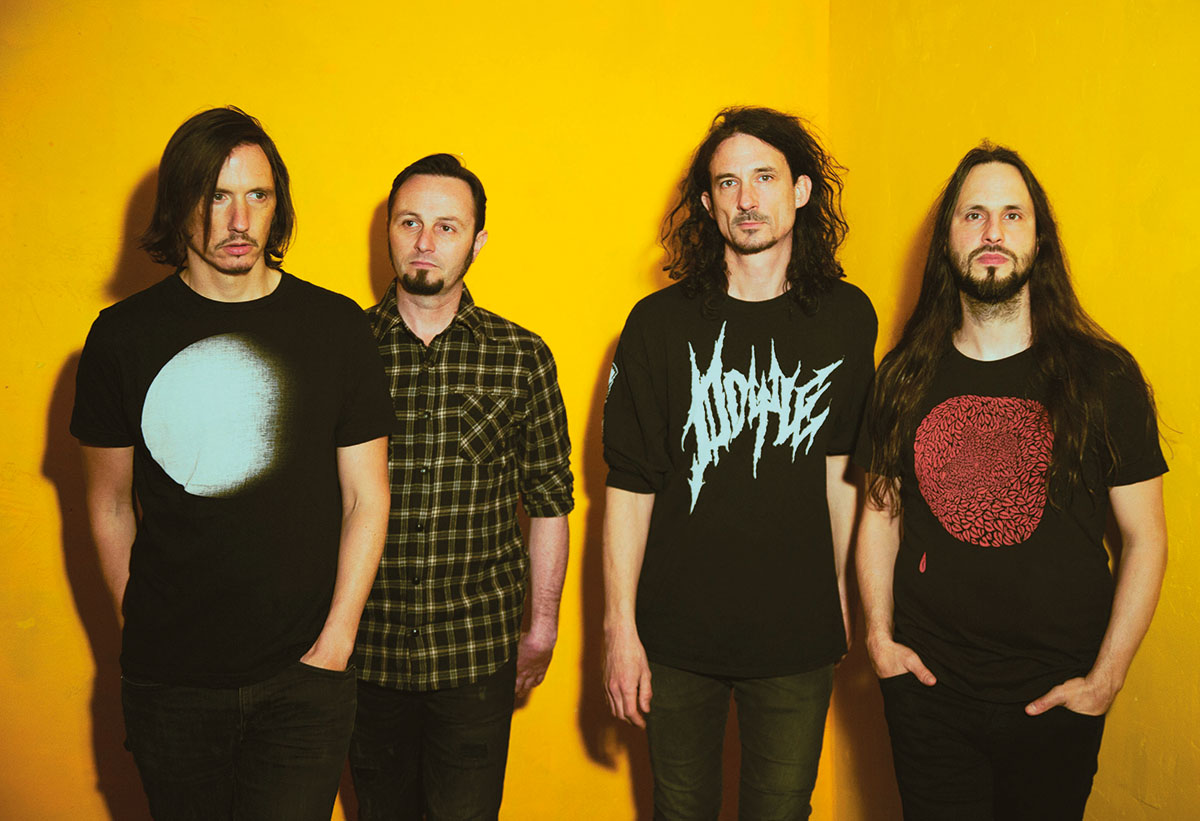
The Chant has a truly wild solo. Tell us about it.
“I played the solo for The Chant on my first electric guitar. It was a Gibson Flying V that a friend of mine sold to me when I was a kid. There was a problem with the ground, and we found a solution: I attached an old string to the bridge and put the string in my mouth and it grounded it. [Laughs] For some reason there was a ghost in that guitar. There was this hum, so I put a leash on that guitar and put it in my mouth when I was playing the solo. [Laughs] I had a blast.“
You guys also sound like you were having fun with the Whammy pedal on New Found.
“[Laughs] Whammy is so magical! We started using it on Magma. We’re having way too much fun with it; we can’t stop using it.“
Sphinx showcases a pick-scrape technique that’s become a Gojira calling card. Can you describe what you’re doing?
“My approach to guitar is very physical… but not sexual. [Laughs] I have a physical approach to instruments; sometimes I’ll pound on the guitar and it’ll go 'boom' and I’ll use that in a song. That technique wasn’t premeditated. It happened live on tour in 2002 or 2003. The catalyst… was the song Embrace the World [from 2003’s The Link]. Toward the end of the song there’s a riff with a guitar slide…
“When we were playing live, instead of using my left hand to recreate the slide, I wanted to use my right to see if I could simulate a similar sound. I was doing this weird movement with my right hand: scraping the skin of your thumb over the strings. If you have some distortion on, you will get that sound. But it’s basically the rubbing of human skin on electric guitars. [Laughs] … The next album after that, From Mars to Sirius, it was all over it.“
Fortitude was created during one of the craziest years in modern history. Now that it’s wrapped, how would you say the album fits within Gojira’s body of work?
“Nicely. [Laughs]“
[Laughs] Like a glove.
“[Laughs] Like a glove! This album was different because we did way more songs than usual… maybe 20. It’s almost like I lost friends on the battlefield to get to the final 11. [Laughs] … I’m extremely proud of this album. I’m not anxious at all about what people are going to think about it.
First of all, I think they’re going to like it. But even if they don’t, I’m at peace with everything we did. We had fun, we tried some new stuff, and we used the Gojira language we’ve built over so many years.“
- Fortitude is out now via Roadrunner.
Brad is a Brooklyn-based writer, editor and video producer. He is the former content director of Revolver magazine and executive editor of Guitar World. His work has appeared in Vice, Guitar Aficionado, Inked and more. He’s also a die-hard Les Paul player who wishes he never sold his 1987 Marshall Silver Jubilee half stack.
![Gojira - Born For One Thing [OFFICIAL VIDEO] - YouTube](https://img.youtube.com/vi/3p85-KtgDSs/maxresdefault.jpg)
![Gojira - Another World [OFFICIAL VIDEO] - YouTube](https://img.youtube.com/vi/iqrMFNMgVS0/maxresdefault.jpg)


![GOJIRA - Pol'And'Rock Festival 2018 [LIVE] - YouTube](https://img.youtube.com/vi/ISJtvWhkMFQ/maxresdefault.jpg)



